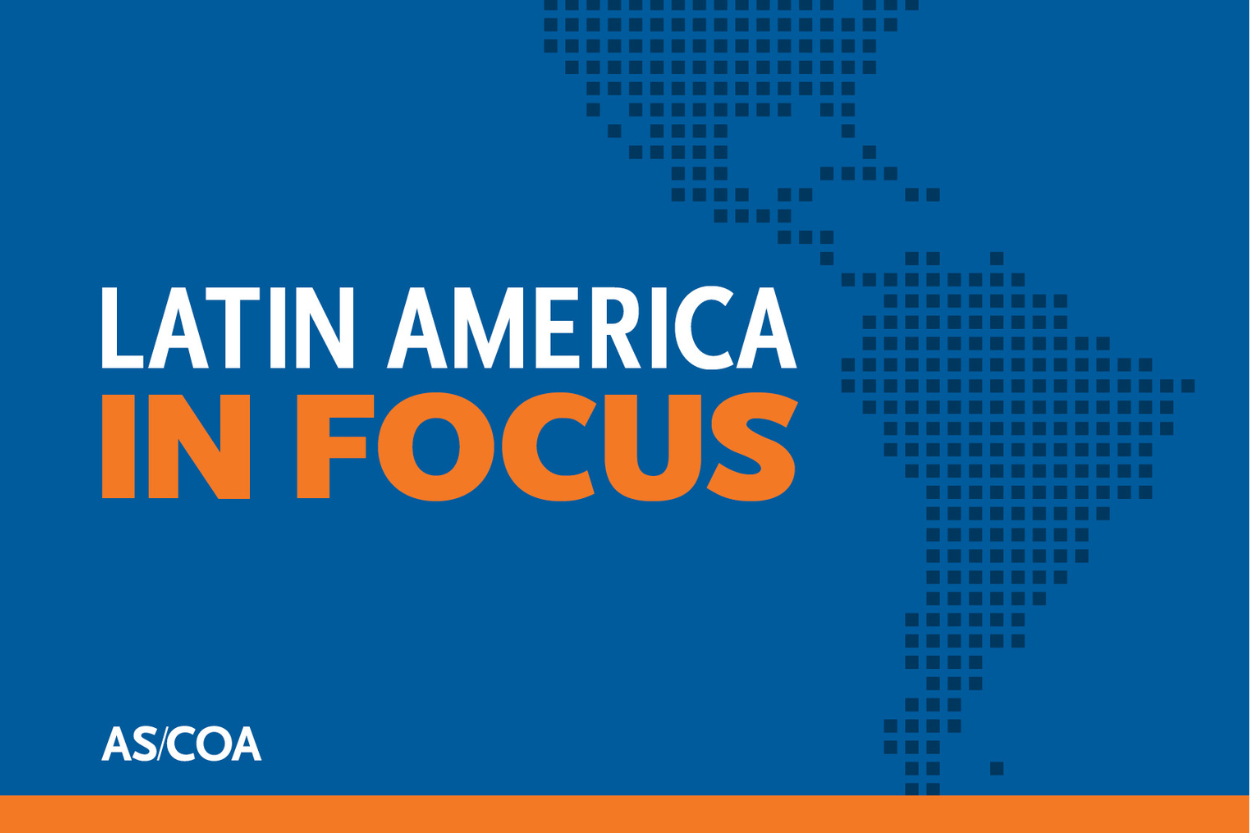Overview of U.S. Policy toward Latin America
Overview of U.S. Policy toward Latin America
Just days before President Bush departed for a five-country tour of Latin America, COA Vice President Eric Farnsworth outlined key areas of cooperation at a hearing before the Subcommittee on the Western Hemisphere.
Pursuing the US Agenda: Attention to U.S. Interests in the Americas a Priority
*** As Prepared for Delivery ***
HEARING BEFORE THE
COMMITTEE ON FOREIGN AFFAIRS
SUBCOMMITTEE ON THE WESTERN HEMISPHERE
U.S. HOUSE OF REPRESENTATIVES
MARCH 1, 2007
ERIC FARNSWORTH, VICE PRESIDENT
Good morning, Mr. Chairman and members of the Subcommittee. It is a privilege to be with you to discuss a topic of such importance and timeliness. As you know, the Council of the Americas ("Council") is a leading policy voice on Latin American, Caribbean, and Canadian issues. For over 40 years, our mandate has been to promote democracy, open markets, and the rule of law throughout the Americas. Thank you for the invitation to speak before you today.
The President’s upcoming trip to Latin America is a timely reminder of the myriad interests that the United States maintains in the region. It provides an excellent opportunity to pursue them within the context of an emerging friendship agenda for the region that we should be pursuing through a variety of different means. For too long the US policy debate has tended toward two extremes. On the one hand, perceived US neglect of the region and the war in Iraq have led some to suggest that US relations with Latin America are fundamentally broken, and that we should expect little in terms of regional cooperation to achieve our goals in the hemisphere. On the other hand, some suggest that Latin America has been unwilling to do much on its own behalf to strengthen its position in the global economy, and has shown little to offer the United States beyond intending immigrants. Therefore, they say, competing global priorities can more usefully be pursued.
Mr. Chairman, I would submit to you that both views are incorrect. The reality is more nuanced, and it is important that we understand both our own interests in the region as well as the tools and prospects we have for achieving them in order that US policy can be most successful over both the short and longer terms. In fact, Latin America is vital to US national security interests. From border security, to energy security, to economic security, to assistance with global issues such as nuclear non-proliferation and peacekeeping, individual Latin American nations have been critical, if frequently underappreciated, partners. And history shows that we have the best chance of achieving our own interests in the Americas when we actively promote the issues of most importance to Latin Americans themselves: accountable representative democracy, broad-based economic development, transparent and effective rule of law, and an overall tone in relations that stresses mutual interests based on true partnership.
The President’s trip provides an excellent opportunity to advance this agenda, and we look for concrete results that bespeak continuously maturing hemispheric relations. As well, we are also pleased the President has said he plans to attend the APEC meetings in Peru in 2008, adding that critical nation to the expanded White House travel itinerary and highlighting the increasingly important relationship between Latin America, North America, and Asia. To be sure, many of the issues I will discuss below, including energy, trade, immigration, and foreign assistance, require Congressional action. The trip is a beginning, but Congress will ultimately have a determinative voice in promoting the US agenda in the Americas, and we strongly encourage the consistent pursuit of core US interests in the Americas across the longer term.
We believe that a key to US relations with Latin America is the relationship with Brazil. It is appropriate that the President will be traveling there first, and that Brazil’s President Lula will return the visit later this month. Without putting undue expectations on the bilateral relationship, nonetheless the President has the opportunity to promote several issues of importance to the United States, within the context of Brazil’s efforts to play a more robust global role. For example, US energy security would be enhanced by working more collaboratively with Brazil to develop and promote ethanol resources, which the Council has strongly supported. Of course, to be most effective, the US tariff on sugar-based ethanol would also have to be reduced or eliminated. As well, even as Iran defies the international community by continuing to develop its nuclear program, Brazil, through its membership in the IAEA and given its own voluntary rejection of nuclear weapons, can be an effective partner in these matters should it decide to play such role. Finally, of course, global trade talks—the Doha WTO agenda—will continue to get a boost to the extent the United States and Brazil work together to address agriculture subsidies and market access issues worldwide. Recent discussions at senior levels have been promising, and they should continue to be pursued with vigor. Promoting a partnership on ethanol would also support such a trade agenda.
Although he travels to Mexico last, the President will also have an excellent opportunity to make progress in our vital relationship with Mexico. Despite his narrow margin of victory in the elections last summer, President Calderon has taken steps to solidify his mandate by reaching out to the opposition while moving to address issues of common concern, including crime and broad-based economic development. By supporting his strong start in addressing criminal activities and in cooperating closely with the United States on law enforcement and border control, the United States can solidify a relationship which has been called our most important worldwide. Of particular note, the US President’s efforts along with his counterparts in Mexico and Canada to develop a stronger, more competitive North America to meet the Asian economic challenge is delivering concrete results, as I saw just last week in Ottawa during a tri-lateral meeting of ministers to discuss the Security and Prosperity Partnership. Of course, the bilateral issue of primary importance to Mexico remains better management of the migration issue, on which I have testified previously before this Subcommittee, and concrete progress to advance a workable solution, including more rapid economic development in Southern Mexico, would be welcomed by Mexico City and would also help us alleviate our own migration concerns.
In Colombia, the President’s visit comes at an important time, when much attention is rightly being focused on the high levels of violence there as well as recent corruption scandals in the legislature. The President will have the opportunity to receive assurances of the concrete steps that the Uribe government is taking to root out and bring to justice those, whether inside or outside the government, who may have provided illicit support for the paramilitaries or engaged in other illegal acts. More must be done. At the same time, we must also recognize the progress that has already been made in Colombia given US assistance under Plan Colombia, and continue to work with the Uribe government, one of the US’ staunchest allies in the region, to assist its efforts to end the vicious FARC and ELN insurgencies while also assisting the fight against drug trafficking. In this regard, passage of the pending trade agreement, which would provide access for US exports into Colombia on the same basis that Colombian exporters already enjoy into the United States, is essential. By passing the pending FTA, Congress would lock in the economic and political gains that have already been made, on a bipartisan basis, to link Colombia to the global economy by providing good jobs for many who would otherwise have limited prospects outside the illegal economy. It would also provide additional tools to support labor and gender rights. The same can be said, frankly, for the pending agreements with Peru and Panama. On the other hand, failing to pass these agreements on a timely basis would severely undercut our friends at a delicate moment, while straining US credibility in regional affairs and global trade matters to the breaking point.
We applaud the President for his decision to travel to Uruguay. Under President Vazquez, a socialist, the government there has proven to be adept in its efforts to pursue a course of pragmatism and thoughtful steps to engage the global economy. When the Council hosted President Vazquez at our annual Washington Conference on the Americas last May, he used the occasion to announce his desire to explore an enhanced trade relationship with the United States, which we endorse, a decision that ultimately led to the recent signing of a trade and investment framework agreement between the two nations. In the famous words of Deng Xiaopeng, it doesn’t matter whether the cat is black or white…what matters is whether the cat catches mice. And President Vazquez is charting a very interesting, independent course within South America. We believe he has created a model for thoughtful engagement with the United States, a true third way, and we encourage the further development of a relationship that may be small in practical terms, but which is outsized in symbolic and strategic terms.
Finally, the President’s travel to Central America will be an excellent opportunity to highlight passage of the Central America-Dominican Republic trade agreement, and to draw attention to the progress made since the end of the last Central American conflict, in Guatemala in 1996. Having said that, Central America remains an impoverished region, plagued by crime stemming from its geographic location between the world’s largest producers of coca and the world’s largest consumers of cocaine and other illicit drugs, as well as the organized gangs that the region’s overwhelmed security forces struggle to contain. Economic growth brought on by the full implementation of CAFTA will directly assist these matters. As well, security cooperation to address street crime within the context of human rights protections and a lack of impunity should be an important priority for the visit, as well as support for infrastructure development through such means as the Millennium Challenge Corporation. After so much progress, treasure, and effort to bring peace to the region, we can ill afford to see democratic institutions eroded by failing to address the challenges that Guatemala and other Central American nations can only resolve in concert with the international community.
Mr. Chairman, members of the Subcommittee, the Latin America agenda is a full one. The President’s upcoming trip is an opportunity to promote a friendship agenda of partnership and engagement with willing regional partners. By doing so, with realistic expectations and a commitment to long-term regional engagement, we will have the greatest opportunity to take steps to achieve fundamental US interests in the Americas while erecting a concrete breakwater against populist and other regional currents inimical to US interests. Working with Congress, the time for such actions is now.
Thank you again for the opportunity to be with you today. I look forward to your questions.







